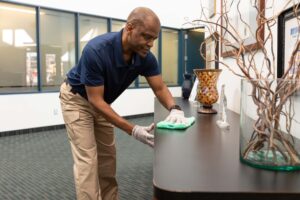When was the last time you stopped to think about how your workplace’s cleanliness affects your team?
If you’re like most busy managers, concerns like cleaning and maintenance likely take a backseat to more visible priorities like deadlines and budgets.
But what if your office’s dirtiness is secretly dampening your employees’ morale and performance?
Clean spaces fuel productivity and well-being in subtle yet profound ways.
This article explores the overlooked impact of cleaning on employees’ psychological states, ability to focus, and overall job satisfaction.
We’ll tackle common cleaning challenges in work environments and provide tips for improvement.
Finally, we’ll examine the merits of outsourcing to a professional cleaning service versus managing an in-house team.
Let’s get started!
The Psychological Benefits of Cleanliness
Research has consistently shown that working in a cluttered, disorganized, or dirty environment negatively affects mental health over time.
The key link lies in the concepts of order and chaos.
Human brains unconsciously associate ordered, tidy environments with stability and control.
When surrounded by organizational chaos, whether in the form of clutter or outright dirtiness, the mind perceives a lack of control.
This fuels uncertainty, anxiety, and ultimately stress.
Conversely, clean and systematically organized workspaces help employees feel a restored sense of command over their environment.
As a result, everyday workplace stressors seem far more manageable.
The Productivity Perks of Clean Spaces
Beyond psychological impacts, a clean and orderly office space also directly enables employees’ ability to focus and be productive.
When desks overflow with papers, surfaces collect dust, and floors grow gritty, employees must expend mental energy coping with the chaos.
This distracts from core tasks requiring sustained focus like writing, analysis, or computer-based work.
Insights from organizational psychology reinforce this.
Studies demonstrate that visible clutter competes for attention against the task at hand by constantly triggering the brain’s novelty-seeking functions.
A pile of unorganized papers or full waste bin pings the subconscious – “You should deal with that mess” – compromising attentional control.
The best professional cleaning services understand this link between cleanliness and output.
They design schedules, checklists, and workflows intended not just to make things look nice but to enable peak workplace functionality.
Cultivating Employee Satisfaction Through Cleaning
Workplace cleanliness also heavily influences employee satisfaction as well as retention rates. Surveys repeatedly show that dirty or disorganized offices result in higher employee frustration. Workers view the state of their work environment as a barometer for how leadership values and respects them.
For example, peeling paint, overflowing trash cans, and caked dust communicate neglect. Employees wonder, “If leadership can’t be bothered to keep our space clean, how much do they really care about us?” This erodes morale and emotional investment in the company.
Conversely, freshly vacuumed carpets, sparkling countertops, and fragrant restrooms signal care and professionalism. Workers feel uplifted and energized to start their days off on the right foot. Studies even indicate employees hesitate to eat or drink at unsanitary desks, compromising productivity.
Leading professional cleaning agencies understand cleanliness’ outsized impact on satisfaction. They incorporate workspace beautification best practices into plans, such as strategically placing plants and artwork. While surface-level, seemingly “extra” touches like these influence retention and enjoyment enormously.
In summary, skimping on cleaning to cut costs often backfires through hidden attrition and growing resentment. However, companies that provide pristine environments reap game-changing benefits in morale and dedication.
The Upsides of Professional Cleaning Services
While maintaining workplace cleanliness is crucial, keeping a large or high-traffic office consistently sanitary presents steep challenges.
Floors rapidly accumulate dirt and debris, restrooms grow unsightly, and public spaces like kitchens become chaotic.
Expanding workload combined with round-the-clock facility usage makes a comprehensive in-house cleaning strategy impractical.
Facility managers simply lack the hours or mental bandwidth to coordinate cleaning teams while also juggling core responsibilities.
Fortunately, outsourcing cleaning duties to a professional janitorial service offers an excellent alternative.
Choosing the Right Cleaning Partner
Of course, some cleaning services focus more on profitability than holistic client care.
So how can you identify a worthy long-term partner that shares your values?
Key traits include:
- Tailors customized plans addressing specialized needs
- Responsive communication and rapid issue resolution
- Proven transition process ensuring no disruption.
Prioritize a spirit of joint accountability during the vetting process.
Clarify expected outcomes and guarantees for slip-ups like missed appointments or subpar performance, but also set periodic strategy reviews to collectively course correct.
By selecting a commercial cleaning company that prioritizes partnership as much as cleanliness, facility managers gain far more than a reprieve from late nights mopping floors.
The true but unseen dividends come in the form of healthier, happier, and ultimately more excellent employees.
Realizing Cleanliness’ True Potential
Workplace cleanliness impacts critical performance factors in profound ways even though its influence flies under the radar. Dirty or disorganized environments actively undermine employee morale, focus, and retention over time as the research shows. Yet with some awareness and the right cleaning partner, managers can transform their cultural foundation.
Leaders who recognize cleaning’s outsized impact take decisive action even in large, busy facilities.
By partnering with a professional service aligned in values and accountability, your spaces can ascend from disorder to inspiration. And your people gain the chance to truly spread their wings, uplifted by an environment demonstrating you care.
So the next time you’re rushing past spills or debris without a second thought, pause and consider the deeper message being sent.
Ask if your cleaning strategies proactively fuel excellence or just react after the fact.
If doubts creep in, make the call and enlist some cleaning reinforcements.



